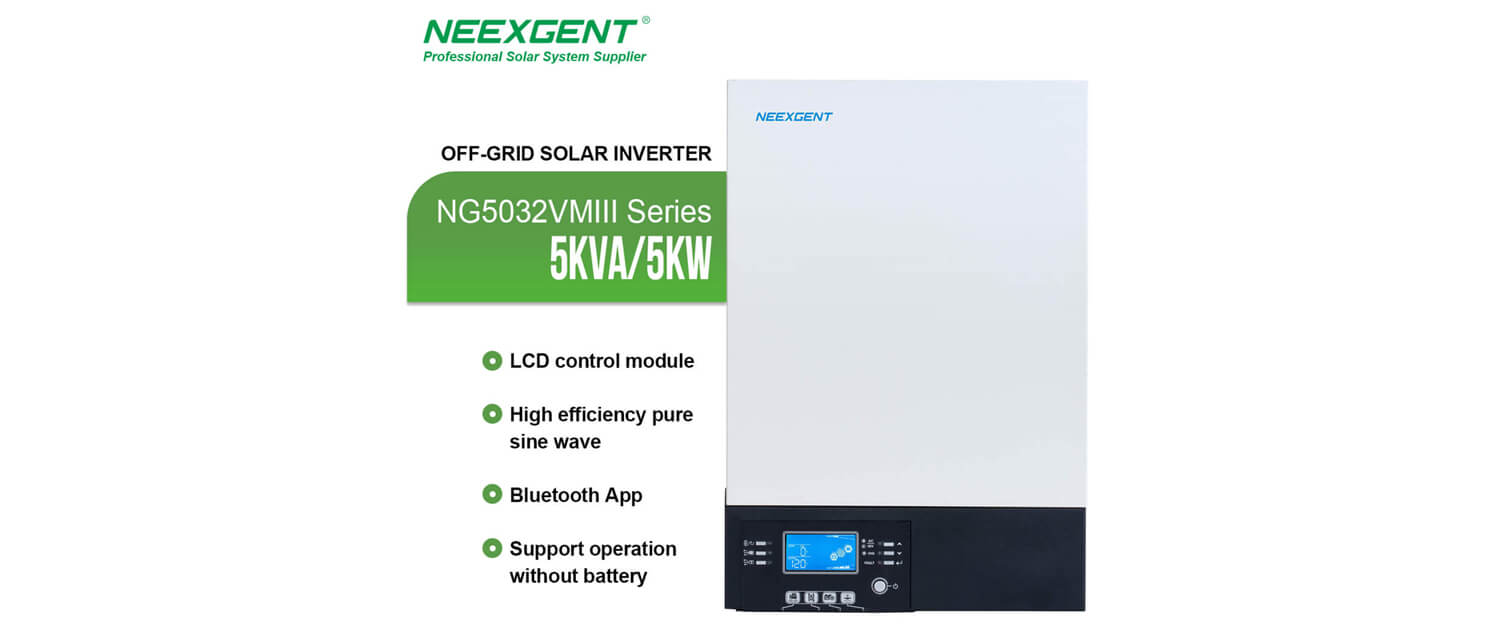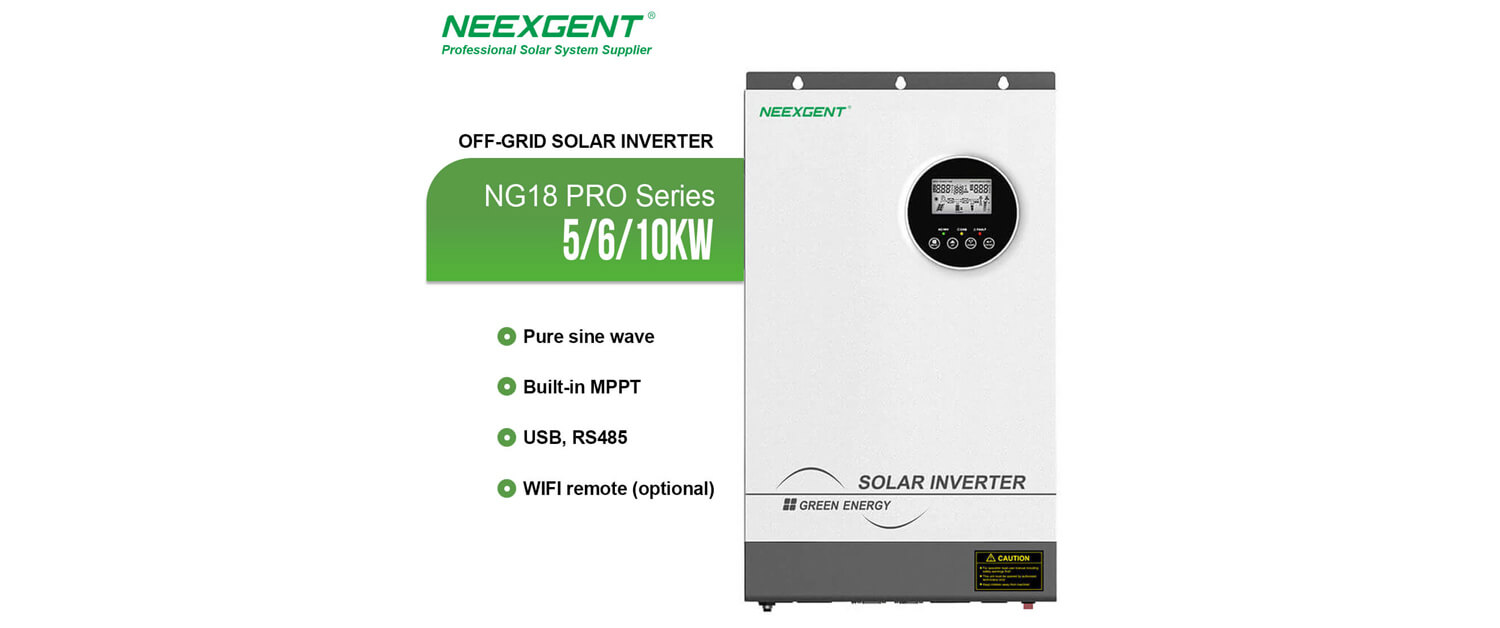Inverters have become an integral part of our lives, enabling us to efficiently utilize the power generated from renewable sources. Belgium, with its progressive renewable energy policies, is witnessing a surge in the adoption of solar panels and inverters. However, to maximize the benefits of your inverter and ensure its longevity, it is crucial to understand how to use it correctly. This article aims to guide Belgian residents in utilizing their inverters effectively and efficiently.

Neexgent Solar Inverter 5kw Mppt Off Grid Solar Inverter
1. Familiarize Yourself with the Inverter:
Before delving into the technicalities, it is essential to familiarize yourself with your inverter. Read the user manual provided by the manufacturer to understand the functionalities, safety precautions, and maintenance requirements specific to your inverter model. Pay close attention to the recommended operating conditions, load capacities, and warranty terms.
2. Professional Installation:
To ensure optimal performance and safety, it is highly recommended to have your inverter installed by a professional. An experienced electrician or a certified installer will adhere to the local regulations, properly connect the inverter to your solar panel system, and address any technical requirements. This step will provide you with peace of mind, knowing that the installation has been done correctly.
3. Placement and Ventilation:
Proper placement and ventilation are crucial for the efficient functioning of your inverter. Ensure that the inverter is installed in a well-ventilated area, away from direct sunlight, heat sources, and moisture. Adequate ventilation prevents the inverter from overheating, which can impact its performance and lifespan.
4. Monitoring and Maintenance:
Regular monitoring and maintenance are essential to keep your inverter in top condition. Many modern inverters come with built-in monitoring systems that allow you to track the performance and energy production. Keep an eye on the display or connect to the monitoring system to identify any issues promptly. Additionally, schedule periodic maintenance checks by a professional to ensure optimal functionality.
5. Grid Connection and Regulations:
In Belgium, it is mandatory to comply with grid connection regulations when using an inverter. Ensure that your inverter is compliant with the local grid connection requirements and safety standards. Consult with your installer or electrician to ensure a proper connection, including the installation of appropriate surge protection devices and safety switches.
6. Overload and Surge Protection:
Protecting your inverter from electrical overloads and power surges is essential for its longevity. Avoid connecting appliances or devices that exceed the inverter's capacity, as this can cause overheating or damage. Consider using surge protection devices, such as surge protectors or uninterruptible power supplies (UPS), to safeguard your inverter and connected devices against sudden voltage spikes.
7. Battery Usage (If Applicable):
If your inverter is equipped with battery storage, understanding its usage is vital. Follow the manufacturer's guidelines regarding battery maintenance, charging, and discharging cycles. Regularly monitor the battery's state of charge and take necessary steps to prevent overcharging or deep discharge, as these can adversely affect the battery's performance and lifespan.
8. Energy Consumption Optimization:
To make the most of your inverter and reduce energy costs, consider optimizing your energy consumption. Take advantage of your inverter's monitoring capabilities to identify peak energy production periods and adjust your usage accordingly. Time your high-energy-consuming activities, such as running appliances or charging electric vehicles, during times when your solar panels are generating the most electricity. This can help you maximize self-consumption and minimize reliance on the grid, leading to potential savings on your energy bills.
9. Software Updates:
Inverter manufacturers often release software updates to improve performance, enhance functionality, and address any identified issues. Stay informed about the latest firmware updates for your specific inverter model and follow the manufacturer's instructions for updating the software. Regularly updating your inverter's software ensures that you have access to the latest features and optimizations, keeping your system up to date and functioning at its best.
10. Safety Precautions:
While inverters are generally safe to use, it is essential to observe some safety precautions. Ensure that your inverter is installed in an area inaccessible to children or unauthorized individuals. Familiarize yourself with the emergency shutdown procedures outlined in the user manual in case of any electrical faults or emergencies. Additionally, if you suspect any unusual behavior or malfunctioning of your inverter, contact a professional immediately to diagnose and address the issue.
11. Environmental Considerations:
Being mindful of environmental factors can contribute to the efficient operation of your inverter. Keep the area around your inverter clean and free from dust, debris, or any other potential obstructions. Regularly inspect the inverter for signs of damage or pest infestation and take appropriate measures to mitigate any risks. Additionally, when disposing of old or malfunctioning inverters, adhere to the local regulations for electronic waste disposal to minimize environmental impact.
12. Seek Professional Assistance:
If you encounter any technical difficulties, errors, or issues with your inverter that are beyond your knowledge or expertise, it is best to seek professional assistance. Qualified electricians, installers, or the manufacturer's customer support can provide the necessary guidance, troubleshooting, and repairs to ensure the optimal performance of your inverter system.

Neexgent Ng1800 Pro Series Solar Inverter
By using your inverter correctly in Belgium, you can maximize the benefits of your solar panel system and ensure its long-term reliability. Familiarize yourself with your inverter, invest in professional installation, maintain proper placement and ventilation, monitor its performance, adhere to grid connection regulations, protect against overloads and power surges, and follow battery usage guidelines if applicable. By incorporating these practices, you can optimize your inverter's efficiency, prolong its lifespan, and contribute to a sustainable energy future.







